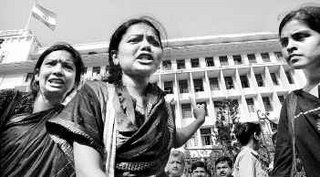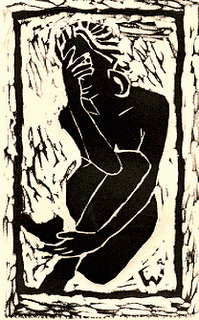 Khairlanji and the English press
Khairlanji and the English press
Why this silence over such savagery? Surekha and Priyanka Bhotmange’s face and name should have become as much part of our consciousness as Jessica Lal’s and Priyadarshini Mattoo’s.
Jyoti PunwaniOn December 5, a Mumbai paper carried on Page 1, pictures of two residents who live near Mumbai’s Shivaji Park ready to leave home with bags packed. They were moving out to avoid the influx of Dalits to Shivaji Park on December 6, Dr Ambedkar’s death anniversary.
Dalits converge on Shivaji Park every December 6, and except for a stock picture of rustic poor women buying Ambedkar mementos at makeshift stalls, the event passes off unnoticed by the English press. This time, though, a larger show of strength was expected, given the backdrop of Dalit violence all over Maharashtra following the Khairlanji incident. The Police Commissioner had recommended a holiday be declared to minimise the impact of thousands of Dalits running riot. Large graphics showing which roads to avoid were published; "don’t step anywhere near Dadar’’ was the advice Mumbaikars gave each other.
In the backdrop of all this, the front-page story made sense. Why then did it leave a bad taste, the feeling that the sane were fleeing before the advent of the barbarians? Hadn’t Shiv Sainiks been vandalising the surroundings of Shivaji Park for the last 40 years every Dussehra Day, charged up by Bal Thackeray’s speech? Did these residents panic then? Had the Dalits who converged every December 6 ever created a nuisance?
The report did answer the last question. Apart from the park and roads being full ("I can’t take my evening stroll, nor can I walk my dog, no one can reach my restaurant/clinic’’), the main problem seemed to be the sight of people bathing in the open. Ironically, it was a 21-year-old medical student who found this sight "upsetting’’. Well known critic and Dadar resident Shanta Gokhale’s dissenting voice was quoted at length - the annual congregation created no noise, no stink; instead, she admired the excellent arrangements and the rich confluence of languages there.
Yet, the pictures on Page 1 set the tone of the piece.
Is this an over-reaction? Given the English press’ coverage of Khairlanji, it doesn’t seem so. Few readers of the English press in Mumbai, capital of the State in which the incident took place, know the gory details: the public stripping of mother and daughter, the directive to the brothers to have sex with the sister, the mutilation of the genitals of the brothers (one of them blind) when they refused, the rape of mother and daughter and the insertion of objects inside the daughter’s vagina, then the dumping of the body in the pond…
The girl was a Std XII merit list ranker. These details are available on the Net, so it’s not as if nobody could access them.
Why this silence over such savagery? The mother-daughter’s face and name - Surekha and Priyanka Bhotmange - should have become as much part of our consciousness as Jessica Lal’s and Priyadarshini Mattoo’s. The sole survivor, the father --- Bhaiyyalal Bhotmange, should have been on Page 1 for days. The relatives, the other Dalits in the village, the scene of the crime, the opinions of Dalit intellectuals, the local police’s views - all this should have been written about to the extent that we could picture this crime the way we can Tamarind Court. Khairlanji after all, is just 150 km from Nagpur.
Instead, only one story in the Mumbai edition of the Times and the Express carried the incident in its outline -- that too, more than a month after it took place. The Times’ report itself made mocking references to the press ignoring the story, but didn’t forget to mention more than once, the `allegation’ put forward by the aggressors - that the mother was having an affair with her cousin, the Police Patil, which had angered the rest of the village. The entire sequence of events- the dispute over land, the attack on the Police Patil, the fact that the Bhotmanges had given statements against the attackers, the latter’s public declaration that they would teach the former a lesson --- all this came to light much later, when the IG’s investigation into the incident was reported. That was front-paged by the Express; it was after all, a hand-out from the police, just as most of the coverage on Khairlanji was in the English press.
Speculations by the Home Minister and the police on the hidden hand behind the Dalit protests made more headlines than the incident itself. The photographs echoed this perspective: a brilliant Page 1 pic of a golden statue of Buddha looking on at the flames of the violence remains in mind. Shouldn’t the pictures of the Bhotmanges’ bodies been on Page 1?
Even while the protests were on, there was no detailed interview with Dalit intellectuals, protestors or leaders, except to get their response to the allegations by policemen.
* * *
If Khairlanji was one instance of the English press toeing the Establishment line, the reportage of the investigation into the July 11 train bomb blasts in Mumbai is another. The English press in Mumbai has acted almost as a mouthpiece of the Mumbai police, most newspapers even dispensing with the word `alleged’ when printing the police’s accusations against those they’ve picked up on mere suspicion. ``He made the bombs’’ screamed one headline, with the face of the alleged culprit circled. Another headline spoke about the unusually high number of Unani doctors picked up.
It is noteworthy that most of these stories were published even before the alleged culprits were formally charged. The reports were not more than information given by policemen about suspects. Every claim of the ATS (Anti-Terrorist Squad) was published; hence every suspect picked up was a ``mastermind’’ and a ``key catch’’. Even after the courts discharged three of these masterminds, because the ATS submitted that there was nothing to link them to the crime, the newspapers continued to publish whatever the police told them. Pakistan’s hand in the blasts was announced again and again, yet, when it came to the crunch, ie, presenting evidence of that to Pakistan, the ATS backed out. Again, that didn’t affect the ATS’ credibility as far as the press was concerned.
On the other hand, if at all the suspects’ families were interviewed, standard devices denoting disbelief such as the use of the word ``claim’’, and inverted commas, were freely used.
Whenever a suspect was picked up, his family’s claims of innocence were also published. However, afterwards, there was total silence about the treatment of the accused in custody, broken only by the Indian Express front-paging the contents of affidavits filed by some relatives of the accused, alleging torture. However, allegations of torture made after that by the accused in court, were put in the inside pages, again with liberal use of words such as ``allege’’.
This reporter has had two stories turned down by leading newspapers: one, an interview with the family of the main accused, who were willing to go on record about their torture by the police; another, an interview with a man picked up on suspicion and let off the next day.
The reasons given were, for the former, the denial of the allegations by the ATS chief. The report carried his denial. Was he expected to admit that his men had tortured innocents? The condition placed for the latter interview was that ``everyone must come on record’’. But the interviewee, having had a traumatic first brush with the police, was unwilling to give his name. Would this have been the first time that false names would have been used in a report?
It is understandable that on such sensitive issues, journalists should not be used by terrorists to make false allegations against the police. But what about applying the same standards to the police? Given the abject and gruesome record of the Mumbai police in handling terrorist cases - the Khwaja Yunus case is still making news - why does the English press suspend disbelief every time a police officer opens his mouth?
The outcome of printing whatever the police say has created a neat divide in Mumbai. By and large, Muslims believe what the Urdu press says - that not one of those picked up is guilty; non-Muslims believe the English press. ``Finally, if those arrested are acquitted, the headline won’t be `Innocents walk free’,’’ said a youth who too had been picked up only because his brother, a SIMI member, was absconding. ``The headline would be: ‘Blast accused acquitted.’’’
The sister of two of the accused, Faisal and Muzammil Shaikh, asked me, ``Isn’t the press supposed to expose the truth? Then why hasn’t any of the reporters written what we told them?’’ Little did she know that this reporter too would fall in that category.
The role of the English press becomes even more questionable because of its silence on those arrested for the Nanded blasts. Most of them are RSS members, but unlike the Mumbai blast suspects, nobody knows anything about them: their professions, their habits…Given that they belong to the same outfit to which our former PM and Home Minister, also the current leader of the Opposition belong, isn’t it important to investigate their links, to get these worthies to comment? But how could that happen? The police have chosen not to go public with their investigation into that blasts, so of course, the English press keeps quiet too.
There have been a few pieces showing up the gaps in the police investigation of the Mumbai blasts, just as there have been very few pieces exposing the government’s cynical response to Khairlanji. But their small number, their placement in inside/oped pages, leaves little impact. For finally, it’s not the edit and oped pages which for the lay reader, define the paper’s policy, but the headlines and reports on the news page.
Contrast the press’ servility to the Establishment on the Khairlanji and Mumbai blasts issue to its open opposition to the Centre and support for the agitators on the reservation issue. What conclusion do we draw from this about the English press’ biases?
 Living goddess stripped of status
Living goddess stripped of status 
 Khairlanji and the English press
Khairlanji and the English press

 Nobel Peace Prize winner itching for a fight
Nobel Peace Prize winner itching for a fight